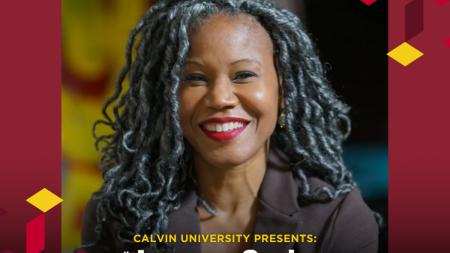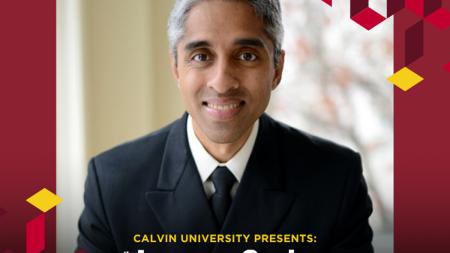A Hopeful Lesson in Holy Anger

Anger can be a terribly destructive emotion, especially if it is left unchecked and comes out as a form of vengeance or retribution directed at other people, said Rebecca Konyndyk DeYoung in a recent lecture sponsored by the Calvin Institute of Christian Worship.
At the same time, she added during her presentation, anger – as expressed by someone such as Jesus – can have a sacred, hope-filled, and life-restoring aspect to it.
“Anger can be an appropriate response on occasion, but too much of it is bad. . . . You have to ask, ‘Where is your anger rooted – is it rooted in your love for humanity?’” asked the Calvin University philosophy professor. “Does your anger lead to more suffering or to healing?”
Konyndyk DeYoung’s lecture, titled “Christian Formation in a Culture of Anger,” was one of two free public lectures given earlier this summer at the Calvin Theological Seminary chapel. The other lecture was co-presented by Janice McLean-Farrell, a professor at New Brunswick Theological Seminary, and Leopoldo A. Sánchez M., a professor at Concordia Seminary. It was titled “The Migrant Face of the Church: The Church Catholic in an Age of Migration.”
Konyndyk DeYoung said we live in a culture that teaches us anger and retaliation are normal and even expected responses to events, situations, or people who do or say something that crosses us the wrong way. This reflects the “my way or the highway” approach that is popular throughout our society.
At the same time, she added, anger can be a healthy reaction to injustice and oppression.
“Anger is such a self-protective emotion, and so much anger is justified in our culture,” she said. “But we need to look at the emotions behind our anger.”
Simply put, why are we angry, and what will be the result of letting our anger flow and possibly hurt, or even destroy, relationships we have with others? Is our anger used as a way to
injure, abuse, or get back at other people? Or does it build up instead of tearing down?
The bubbling, boiling kind of anger that we can feel when we are crossed the wrong way and our pride is hurt, not only eats away at and causes harm to ourselves, said Konyndyk DeYoung, but it blocks our access and connection to God. Every time you get angry and seek to avenge yourself on someone else, you throw up obstacles to prayer. Our anger often shuts the door to God’s goodness and grace. When we vent our wrath, we rarely reap any kind of healthy reward.
Yet, said the philosophy professor, “there is good and bad anger. The question is, ‘Are you angry at the right things?’ Is your anger self-centered? Is it about your expectations and not getting your way?” asked Konyndyk DeYoung.
“Important to realize is that the emotion of wrath blinds you to seeing the vision of Christ. When angry, you lose knowing the imago dei, the image of God. You lose the ground you stand on.”
Konyndyk DeYoung is the author of Glittering Vices: A New Look at the Seven Deadly Sins and Their Remedies, which examines how the sins of envy, gluttony, sloth, lust, pride, greed, and wrath (or anger) help to define our culture today and lead to our separation from God and godly living.
In the book, she discusses how these sins affect our lives and how, as Christians, we need to deal seriously with them through various methods of self-awareness, prayer, and Christian formation.
Often, she added, anger disguises a range of other emotions such as fear, loss, pain, or sadness, and by recognizing and dealing with those emotions, with the help of others and focusing on God, we can short-circuit our anger and gain a more clear-eyed view of ourselves and our circumstances.
“It helps when we can, for instance, acknowledge our pain or loss or fear instead of trying to ignore it” and cover it up with anger, said Konyndyk DeYoung.
In a key part of her lecture, she compared commonplace, frequently self-destructive anger – typically an emotional explosion directed at others and situations outside of ourselves – with a kind of holy anger.
Holy anger can be anger at injustice – particularly when we link hands and hearts with others to address any of the many forms of injustice in the world.
“We need to look at the character of Christ and how he deals with anger,” she said. “When Jesus was angry, it was an appropriate – and not self-destructive – anger.”
When Jesus got angry, it was at the sins and narrow-minded shortcomings of others, especially the Pharisees, who were experts in the law but did not lead the people faithfully. “His anger was the result of love, and it ends up leading to healing,” she noted.
Konyndyk DeYoung pointed to the early verses of Mark 3 as an example of what made Jesus angry and how he handled it.
On the Sabbath Jesus went into a local synagogue and, as the Pharisees looked on, he came across a man who had a shriveled hand.
Looking for a reason to accuse Jesus of breaking the Jewish law, the Pharisees were keenly looking on as Jesus said to the man with the shriveled hand, “Stand up in front of everyone.”
Then Jesus asked the Pharisees, “Which is lawful on the Sabbath: to do good or to do evil, to save life or to kill?”
But the Pharisees, as they often did in situations such as this, remained silent. That made Jesus angry, and he grew “deeply distressed at their stubborn hearts.” So he said to the man, “Stretch out your hand.” The man “stretched it out, and his hand was completely restored.”
Why was Jesus angry in that situation?
Konyndyk DeYoung explained that Jesus was angry and distressed because he longed for the Pharisees to show love. “When anger is the result of love, it is holy anger. It shows the importance of loving your neighbor as yourself,” she said.
So you can blow up like a volcano and let your wrath spew all over others and scorch yourself in the process, or you can follow the lead of Christ, said Konyndyk DeYoung. You can pick your battles so that the anger you express – particularly over things that are unjust – can be holy, healthy, and, above all, a fervent cause of hope.


